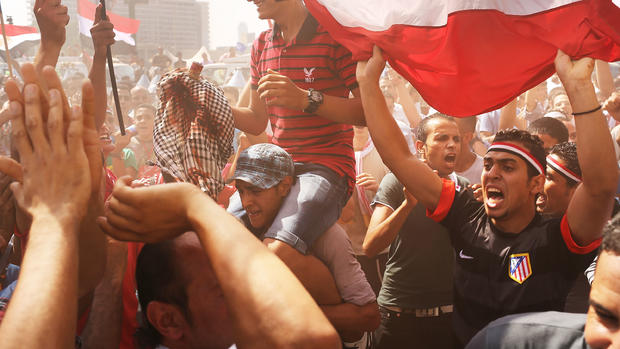Egypt's interim leader vows to protect country from chaos
CAIRO Egypt's interim president pledged Thursday to protect his country against those who seek chaos and violence in the aftermath of a popularly backed military coup, promising that justice and reconciliation will be for all.
President Adly Mansour gave his first address to the nation ahead of planned protests Friday by ousted President Mohammed Morsi's Muslim Brotherhood. Egypt's military, already worried by post-coup violence that has killed more than 60 people, issued a stern warning about causing unrest during the scheduled protests by both the Brotherhood and Morsi opponents.
In his eight-minute, pre-recorded message broadcast on state television, Mansour said Egypt is going through a "decisive period" in its history where some want to drag the country toward the "unknown" and cause chaos.
- Egypt swears in supreme court chief justice Adly Mansour as interim president
- Egypt interim president sets timetable for elections, constitution reform
- Egypt swears in new cabinet, including general who ousted Morsi
"They want this period to be an introduction to violence and blood, and we want it to establish for the concept of protecting lives and human rights," Mansour said.
He did not name those who he said "are pushing the nation toward the abyss thinking they are doing good" — but clearly was referring to pro-Morsi protesters. He said those who protested against Morsi starting June 30 are "the genuine owners of legitimacy."
Mansour said his government is committed to realizing security and stability and will not be "scared or terrorized." He vowed not to be "lenient with those who kill the innocents."
"We will go through the battle for security to the end. We will preserve the revolution," he said. "History will not turn around."
Mansour said justice and reconciliation will be "for all, without exclusion or exception," suggesting that the process will include Islamists and former regime officials.
A senior Brotherhood official and former lawmaker, Saad Emara, told The Associated Press after the speech that his group doesn't recognize Mansour as the country's leader. Emara called Mansour merely a representative of Gen. Abdel-Fattah el-Sissi, the nation's army chief.
Mansour's speech is a sign that he and the interim administration are nervous of any opposition on the street, Emara said.
"There is a contradiction in his speech between the threats and the call for reconciliation," Emara said. "They want to turn this page."
A massive rally is planned for Friday by supporters of Morsi, overthrown two weeks ago in a military coup following massive protests against him. The Muslim Brotherhood continues to demand Morsi's reinstatement. Anti-Morsi protesters also have called for demonstrations Friday to celebrate Morsi's ouster and Mansour's naming of a new Cabinet.
Some protests since the coup have turned violent. In a statement posted Thursday on Facebook, military spokesman Col. Ahmed Mohammed Ali said that "whoever resorts to violence and deviates from peacefulness in Friday's rallies will put his life in danger."
Violators "will be dealt with decisively according to the law," Ali said.
Brotherhood spokesman Ahmed Aref denied claims circulating Thursday that Morsi supporters planned to be violent in the coming protests, telling journalists that sit-ins held since before the coup showed their movement is peaceful. One speaker at Aref's news conference, who didn't identify himself, earlier claimed that Egyptian intelligence agents spread the rumors, but did not elaborate.
"We vehemently deny that we have pamphlets calling for road blocking or targeting military installations. All this is misleading," Aref said.
Brotherhood officials in the past have accused security agencies of setting them up, including one incident in which they say violence in Sinai was staged to legitimize a crackdown against Islamists. The suspicion comes amid increasing tension between Islamists and the military following the coup.
That tension erupted in violence in the bloodiest single incident of Egypt's two-and-a-half years rocky transition. On July 8, 51 protesters and three security personnel were killed in clashes outside the Republic Guard Club where Morsi supporters believed the leader was held following his July 3 overthrow. Authorities say Morsi is being held now in undisclosed military facility.
The Brotherhood says the military and police opened fire without reason on peaceful protesters. The military says armed Islamists started the violence by attacking the club. Human Rights Watch has said that authorities moved in to break up a peaceful sit-in and some Morsi supporters used live ammunition.
Since the shooting deaths, another large rally organized by Morsi supporters in central Cairo sparked street clashes with the police, in which local residents also attacked Morsi supporters. Seven were killed and hundreds injured in the overnight fighting.
On the eve of Friday's rally, Muslim Brotherhood leader Mohammed Badie issued a statement calling on the military to reconsider its decisions and "return to righteousness ... and accept the will of the people."
The Friday rallies coincide with the tenth day of Ramadan, which Egyptians celebrate as the day the armed forces crossed the Suez Canal in the 1973 war with Israel.
Badie used the occasion to celebrate achievements of the armed forces and appeal to members of the military to remember that their real mission was to defend Egypt.
"We call on the leaders of the coup to return to righteousness, (to) quit what is wrong," he said. In the sit-in by Morsi supporters, organizers read Badie's message. The protesters immediately broke out into the chant: "The people and army are one hand."
Badie and a dozen other Brotherhood figures and supporters are wanted by prosecutors for their alleged role in inciting violence. In his statement, he urged protesters to remain peaceful.
